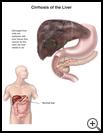
Cirrhosis
________________________________________________________________________
KEY POINTS
- Cirrhosis is a liver disease caused by scarring of the liver over months or years.
- Treatment may include medicine, avoiding alcohol, removing excess iron and copper from your blood, keeping good control of your blood glucose, and sometimes a special diet.
- To prevent cirrhosis, it helps to limit your use of alcohol and to control your weight. Some types of disease that damage the liver can be prevented with vaccines.
________________________________________________________________________
What is cirrhosis?
Cirrhosis is a liver disease caused by scarring of the liver that happens over months or years.
The liver is one of the largest organs and a very important part of your body. Some of the functions of the liver include:
- It helps your body get rid of some medicines and harmful substances.
- It makes bile, which helps your body digest fats.
- It stores sugar, which your body uses for energy.
- It makes many proteins, which are the building blocks for all cells in your body.
If the cause of cirrhosis is not treated or removed, the cirrhosis will get worse and more liver cells will stop working. This can be life threatening.
What is the cause?
Causes of cirrhosis include:
- Alcohol abuse
- Hepatitis caused by viruses or an immune system problem that causes your body to destroy liver cells
- Fatty buildup in the liver, which is often caused by type 2 diabetes or obesity
- Diseases that damage or destroy bile ducts, which are tubes that carry bile from the liver
- Some illegal drugs and harmful chemicals
- Some medicines
- Diseases that are passed from parent to child, such as diseases that cause iron or copper to build up in the liver
The changes in the liver that lead to cirrhosis are gradual. At first liver cells are injured. If the cause of the injury from illness or alcohol abuse continues, the liver cells start to die. Over time, the damaged liver cells are replaced with scar tissue. This scar tissue cannot do the work the liver needs to do. The harmful substances (toxins) that the liver normally clears from your body start to build up in your blood and brain, making you sick.
What are the symptoms?
The symptoms of early liver damage depend on what is causing it. At first there may not be any symptoms, or the symptoms may be very mild. Symptoms may include:
- Feeling tired
- Easy bruising
- Loss of appetite
- Fever
- Nausea or vomiting
- Yellowish skin and eyes (jaundice)
- Itching
- Belly pain
Examples of later symptoms are:
- Swelling of the belly, legs, or ankles
- Bloody vomit
- Bloody or tarlike bowel movements
- Weight loss
- Confusion, memory loss, and difficulty sleeping
- Coma
How is it diagnosed?
Your healthcare provider will ask about your symptoms and medical history and examine you. Tests may include:
- Blood tests
- An ultrasound which uses sound waves to show pictures of the liver and gallbladder
- CT scan, which uses X-rays and a computer to show detailed pictures of the liver
- A liver biopsy, which is the removal of a small sample of tissue for testing
How is it treated?
Treatment depends on what caused the damage to your liver. For example:
- Medicine to treat infections or bile duct disease
- Weight loss and good blood glucose control to treat fatty liver disease
- Removing excess iron or copper if you were born with a disease that causes them to build up in your body
You will also need to avoid alcohol and other substances that harm the liver.
Your healthcare provider or dietitian may suggest changes to your diet, depending on how much your liver is damaged.
Cirrhosis can cause problems in other parts of the body and these will also be treated. For example, medicine can help control the buildup of fluid in the belly. If you have bleeding from the esophagus (the tube that connects your throat to your stomach), or bleeding in the stomach, you may need surgery.
Severe cirrhosis can cause complete liver failure. A liver transplant is a possible treatment for a failing liver. Whether you are a candidate for this surgery depends on your overall health, whether you drink alcohol, use illegal drugs, or other factors.
How can I take care of myself?
- Follow the full course of treatment prescribed by your healthcare provider. You need to avoid taking medicines that can damage the liver more (for example, acetaminophen). Ask your provider which medicines you can safely take for your symptoms, such as itching and nausea. Follow the diet recommended by your provider.
- Don’t drink alcohol or use illegal drugs.
- Ask your provider:
- How and when you will get your test results
- How long it will take to recover
- If there are activities you should avoid and when you can return to your normal activities
- How to take care of yourself at home
- What symptoms or problems you should watch for and what to do if you have them
- Make sure you know when you should come back for a checkup. Keep all follow-up appointments.
How can I help prevent cirrhosis?
- Limit your use of alcohol: no more than 1 drink a day for women and no more than 2 drinks a day for men. If you have a drinking problem, get help from a counselor or Alcoholics Anonymous (AA).
- Some types of viral hepatitis can be prevented with vaccines. Ask your healthcare provider about this.
- Eat a healthy diet and exercise according to your provider’s recommendation in order to maintain a healthy weight.
- Get a regular checkup once a year to make sure your blood tests of your liver and glucose levels are normal.
You can get more information from:
- American Liver Foundation
800-465-4837
http://www.liverfoundation.org

